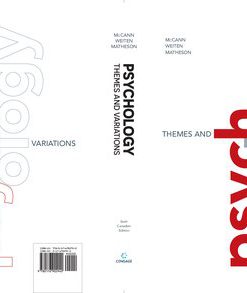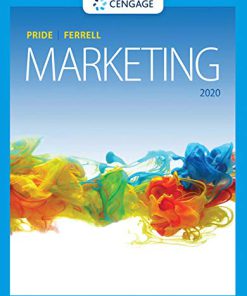Psychology Themes and Variations MindTap Course List 11th Edition by Wayne Weiten 0357374827 978-0357374825
$50.00 Original price was: $50.00.$25.00Current price is: $25.00.
Psychology Themes and Variations MindTap Course List 11th Edition by Wayne Weiten – Ebook PDF Instant Download/Delivery: 0357374827, 978-0357374825
Full dowload Psychology Themes and Variations MindTap Course List 11th Edition after payment

Product details:
ISBN 10: 0357374827
ISBN 13: 978-0357374825
Author: Wayne Weiten
Weiten’s PSYCHOLOGY: THEMES AND VARIATIONS, 11th Edition immerse you in the excitement of this fascinating field while helping you study and retain what you learn. Filled with practical ways that you can apply psychology to your everyday life, this bestselling textbook is an experience in learning that you’ll remember long after you complete your Introductory Psychology course. Critical Thinking Applications in every chapter give you specific strategies you can apply in all of your courses and in your personal life. Reality Checks, many of which may surprise you, address common misconceptions about psychology. Every chapter of this book offers tools — such as Concept Charts that provide colorful visual snapshots of key points — to help you focus on what’s important, showing you how to maximize your study time and course success.
Psychology Themes and Variations MindTap Course List 11th Table of contents:
Chapter 1: The Evolution of Psychology
-
1.1 Psychology’s Early History
- A New Science Is Born
- Structuralism vs. Functionalism
- Freud and the Unconscious
- Watson’s Behaviorism
- Skinner’s Influence and Free Will
- The Humanist Revolt
-
1.2 Psychology’s Modern History
- Professionalization of Psychology
- Renewed Interest in Cognition and Physiology
- Cultural Diversity in Psychology
- Emergence of Evolutionary Psychology
- Positive Psychology Movement
-
1.3 Psychology Today
- Research Areas
- Professional Specialties
-
1.4 Seven Unifying Themes
- Themes related to psychology as a field
- Themes related to the subject matter
-
1.5 Personal Application
- Improving Academic Performance (study habits, reading, lectures)
-
1.6 Critical Thinking Application
- Developing Critical Thinking Skills
- Example to illustrate critical thinking
Chapter 2: The Research Enterprise in Psychology
-
2.1 Looking for Laws: The Scientific Approach
- Goals, Steps, and Advantages of the Scientific Method
-
2.2 Experimental Research
- Variables, Groups, and Extraneous Variables
- Design Variations and Pros/Cons of Experimental Research
-
2.3 Descriptive/Correlational Research
- Correlation Concept, Observation, Case Studies, and Surveys
- Advantages/Disadvantages of Descriptive Research
-
2.4 Evaluating Research
- Biases, Placebo Effects, Self-Reports, Replication
-
2.5 Ethics in Research
- Deception, Animal Research, Ethical Principles
-
2.6 Reflecting on the Chapter’s Themes
-
2.7 Personal Application
- Finding and Reading Journal Articles
-
2.8 Critical Thinking Application
- The Perils of Anecdotal Evidence
Chapter 3: The Biological Bases of Behavior
-
3.1 Communication in the Nervous System
- Neurons, Impulses, Synapses, Neurotransmitters
-
3.2 Organization of the Nervous System
- Peripheral and Central Nervous System
-
3.3 The Brain and Behavior
- Research methods, Hindbrain, Midbrain, Forebrain, Brain Plasticity
-
3.4 Right Brain/Left Brain
- Split-brain research, Hemispheric Specialization
-
3.5 The Endocrine System
- Hormonal Communication
-
3.6 Heredity and Behavior
- Genetics, Research Methods, Environment Influence
-
3.7 The Evolutionary Bases of Behavior
- Darwin’s Theory and Adaptive Traits
-
3.8 Reflecting on the Chapter’s Themes
-
3.9 Personal Application
- Evaluating “Two Minds in One” and Cognitive Processes
-
3.10 Critical Thinking Application
- Building Better Brains and the Perils of Extrapolation
Chapter 4: Sensation and Perception
-
4.1 The Visual System
- Light, Eye, Retina, and Color Vision
-
4.2 Visual Perception
- Form, Depth, Patterns, and Illusions
-
4.3 The Auditory System
- Sound, Ear, Hearing Capacities, Localization of Sound
-
4.4 Other Senses
- Taste, Smell, Touch
-
4.5 Reflecting on the Chapter’s Themes
-
4.6 Personal Application
- Appreciating Art and Illusion
-
4.7 Critical Thinking Application
- Recognizing Contrast Effects
Chapter 5: Variations in Consciousness
-
5.1 The Nature of Consciousness
- Levels of Awareness, Brain Activity
-
5.2 Biological Rhythms and Sleep
- Circadian Rhythms, Sleep Deprivation
-
5.3 Sleep and Waking Cycle
- Stages of Sleep, Sleep Loss, Disorders
-
5.4 The World of Dreams
- Dream Content, Culture, Theories of Dreaming
-
5.5 Hypnosis
- Induction, Phenomena, Theories
-
5.6 Meditation
- Pursuing Higher Consciousness
-
5.7 Drugs and Consciousness
- Types of Drugs, Mechanisms, Effects, Dependence
-
5.8 Reflecting on the Chapter’s Themes
-
5.9 Personal Application
- Practical Questions about Sleep and Dreams
-
5.10 Critical Thinking Application
- Is Alcoholism a Disease?
Chapter 6: Learning
-
6.1 Classical Conditioning
- Pavlov, Terminology, Everyday Applications
-
6.2 Operant Conditioning
- Skinner, Reinforcement, Punishment
-
6.3 Changes in Conditioning
- Biological Constraints and Cognitive Processes
-
6.4 Observational Learning
- Media Violence, Social Learning
-
6.5 Reflecting on the Chapter’s Themes
-
6.6 Personal Application
- Behavior Modification
-
6.7 Critical Thinking Application
- Classical Conditioning in Advertising and Politics
Chapter 7: Human Memory
-
7.1 Encoding
- Attention, Processing, Enriching Encoding
-
7.2 Storage
- Sensory, Short-Term, Long-Term Memory
-
7.3 Retrieval
- Using Cues, Reconstructing Memories
-
7.4 Forgetting
- Ebbinghaus, Repressed Memories
-
7.5 The Physiology of Memory
- Anatomy and Neural Circuitry of Memory
-
7.6 Types of Memory
- Declarative, Non-declarative, Episodic, Semantic Memory
-
7.7 Reflecting on the Chapter’s Themes
-
7.8 Personal Application
- Improving Memory
-
7.9 Critical Thinking Application
- Eyewitness Accounts
Chapter 8: Cognition and Intelligence
-
8.1 Language
- Acquisition, Bilingualism, Culture
-
8.2 Problem Solving
- Types of Problems, Barriers, Cognitive Style
-
8.3 Decision Making
- Heuristics, Biases, Evolutionary Analysis
-
8.4 Measuring Intelligence
- IQ Scores, Reliability, Validity, Cultural Impact
-
8.5 Heredity and Environment
- Genetic vs. Environmental Influences, Cultural Differences
-
8.6 New Directions
- Biological Correlates, Cognitive Processes, Expanding Intelligence
-
8.7 Reflecting on the Chapter’s Themes
-
8.8 Personal Application
- Measuring and Understanding Creativity
-
8.9 Critical Thinking Application
- Pitfalls in Decision Making
Chapter 9: Motivation and Emotion
-
9.1 Motivational Theories
- Drive, Incentive, Evolutionary Theories
-
9.2 Hunger and Eating
- Biological and Environmental Factors
-
9.3 Sexual Motivation and Behavior
- Sexual Response, Orientation, Evolutionary Analysis
-
9.4 Achievement Motive
- Individual Differences, Situational Determinants
-
9.5 Elements of Emotion
- Cognitive, Physiological, Behavioral Components
-
9.6 Theories of Emotion
- James-Lange, Cannon-Bard, Schachter’s Theory
-
9.7 Reflecting on the Chapter’s Themes
-
9.8 Personal Application
- Exploring Happiness
-
9.9 Critical Thinking Application
- Analyzing Arguments and Fallacies
Chapter 10: Human Development Across the Life Span
-
10.1 Prenatal Development
- Stages of Development, Environmental Factors
-
10.2 Childhood Development
- Motor, Social, Language Development, Attachment
-
10.3 Cognitive and Moral Development
- Cognitive Growth, Moral Reasoning
-
10.4 Adolescence
- Changes in Physiology, Identity Search
-
10.5 Adulthood
- Personality, Aging, Family Life, Cognitive Changes
-
10.6 Reflecting on the Chapter’s Themes
-
10.7 Personal Application
- Understanding Gender Differences
-
10.8 Critical Thinking Application
- Fathers and Children’s Well-being
Chapter 11: Personality
-
11.1 Nature of Personality
- Consistency, Personality Traits, Five-Factor Model
-
11.2 Psychodynamic Perspectives
- Freud, Jung, Adler
-
11.3 Behavioral Perspectives
- Skinner, Bandura, Mischel
-
11.4 Humanistic Perspectives
- Rogers, Maslow
-
11.5 Biological Perspectives
- Eysenck, Genetic and Evolutionary Influence
-
11.6 Contemporary Approaches
- Narcissism, Terror Management Theory
-
11.7 Culture and Personality
-
11.8 Reflecting on the Chapter’s Themes
-
11.9 Personal Application
- Personality Assessment
-
11.10 Critical Thinking Application
- Hindsight Bias in Personality
Chapter 12: Social Behavior
-
12.1 Person Perception
- First Impressions, Attribution Theory
-
12.2 Attitudes
- Development, Influence, Cognitive Dissonance
-
12.3 Conformity, Compliance, and Obedience
- Asch, Milgram, Zimbardo
-
12.4 Aggression
- Biological, Environmental Factors
-
12.5 Attraction
- Theories, Influences, Relationship Development
-
12.6 Helping Behavior
- Altruism, Bystander Effect
-
12.7 Group Behavior
- Groupthink, Polarization, Leadership
-
12.8 Reflecting on the Chapter’s Themes
-
12.9 Personal Application
- Dealing with Social Pressures
-
12.10 Critical Thinking Application
- Understanding Group Dynamics
Chapter 13: Psychological Disorders
-
13.1 Defining Psychological Disorders
- Classification Systems, Criteria for Diagnosis
-
13.2 Anxiety Disorders
- Types, Causes, Treatment
-
13.3 Mood Disorders
- Depression, Bipolar Disorder, Causes and Treatment
-
13.4 Schizophrenia
- Symptoms, Causes, Treatments
-
13.5 Personality Disorders
- Types, Origins, Treatment
-
13.6 Therapies
- Approaches, Psychotherapy, Drug Therapy
-
13.7 Reflecting on the Chapter’s Themes
-
13.8 Personal Application
- Mental Health Resources
-
13.9 Critical Thinking Application
- The Stigma of Mental Illness
People also search for Psychology Themes and Variations MindTap Course List 11th :
fun topics in psychology
topics in psychology class
psychology topics list
psychology programs in minnesota
Tags:
Wayne Weiten,Psychology Themes,Variations MindTap Course
You may also like…
Uncategorized
Computers - Programming
Engineering - Automotive
History & Research
Psychology, 11th ed: Themes and Variations 11th Edition Wayne Weiten
History & Research
Discovering Psychology: The Science of Mind (MindTap Course List), 4th Edition John T. Cacioppo
Politics & Philosophy - Politics
Physics - Physics of the Atmosphere
Physics for Scientists and Engineers (MindTap Course List) 10th Edition Serway











